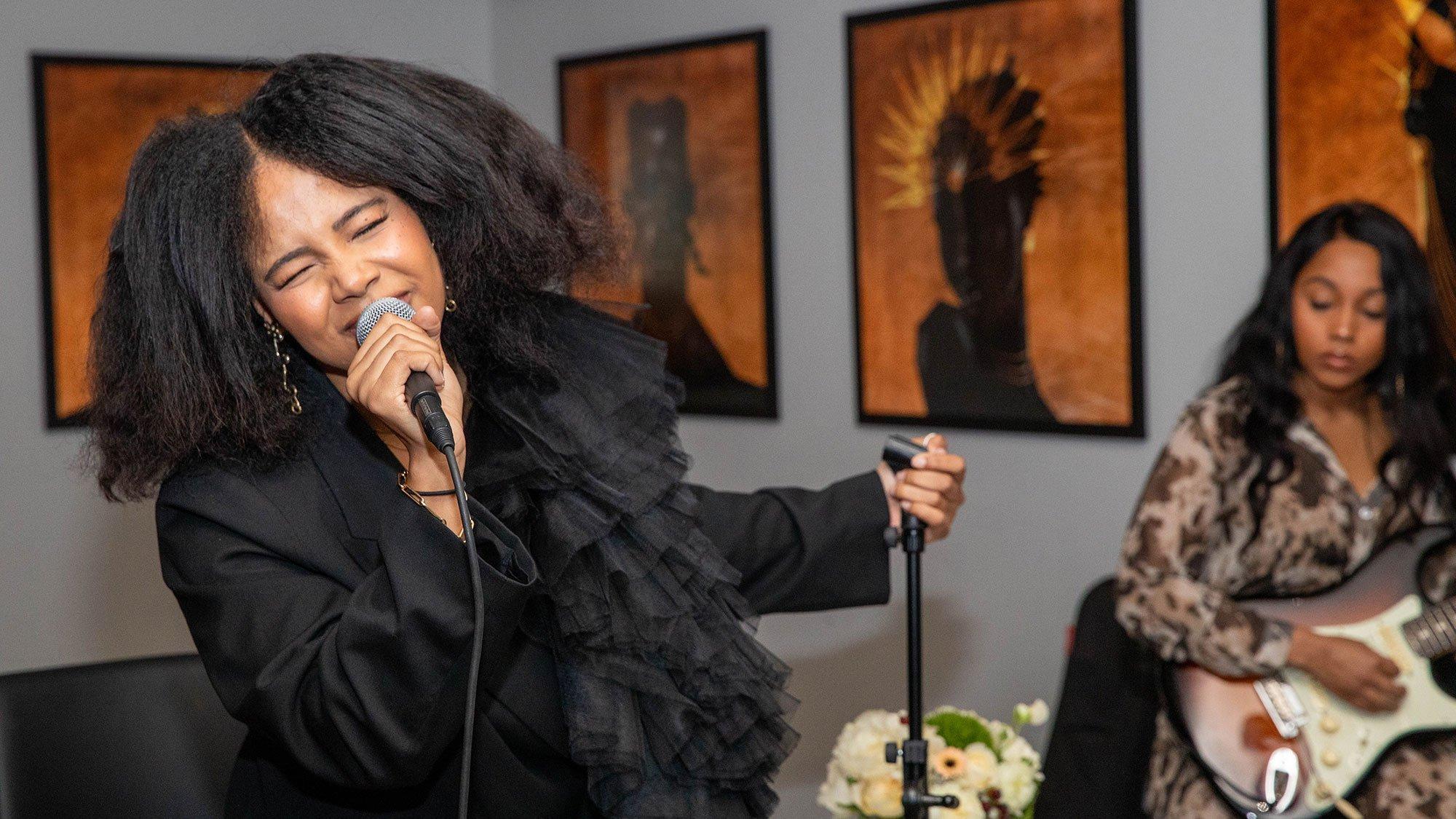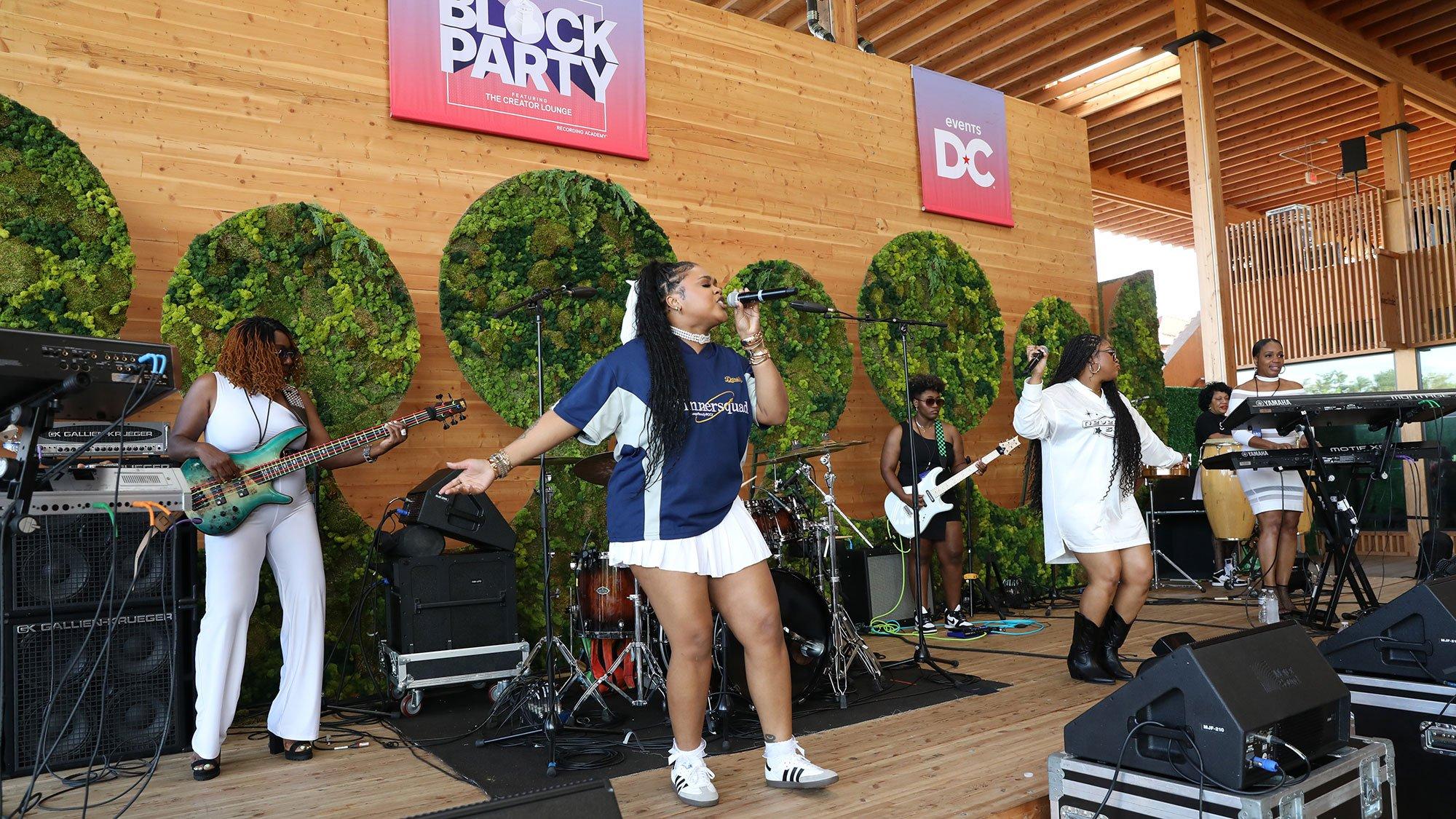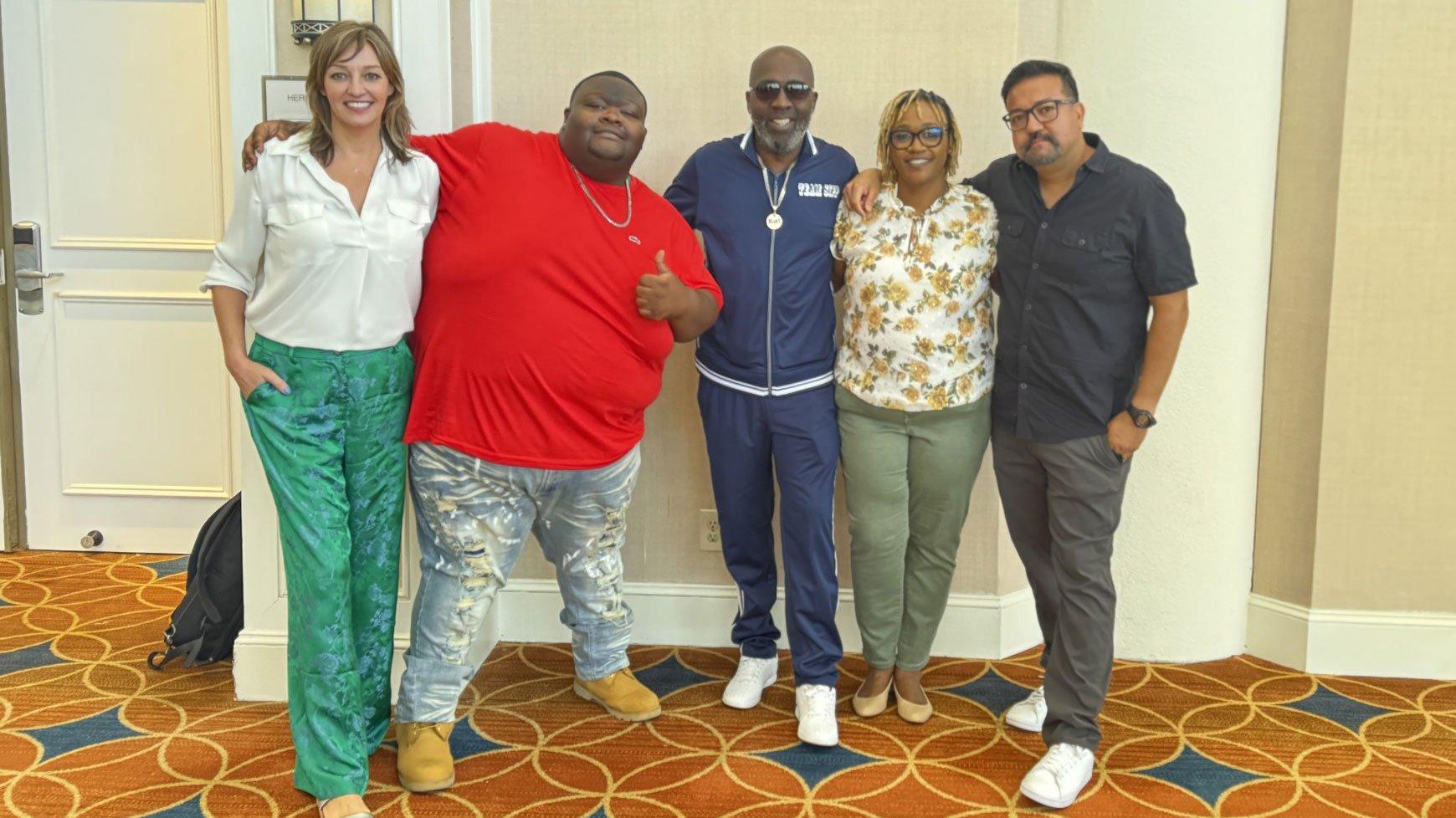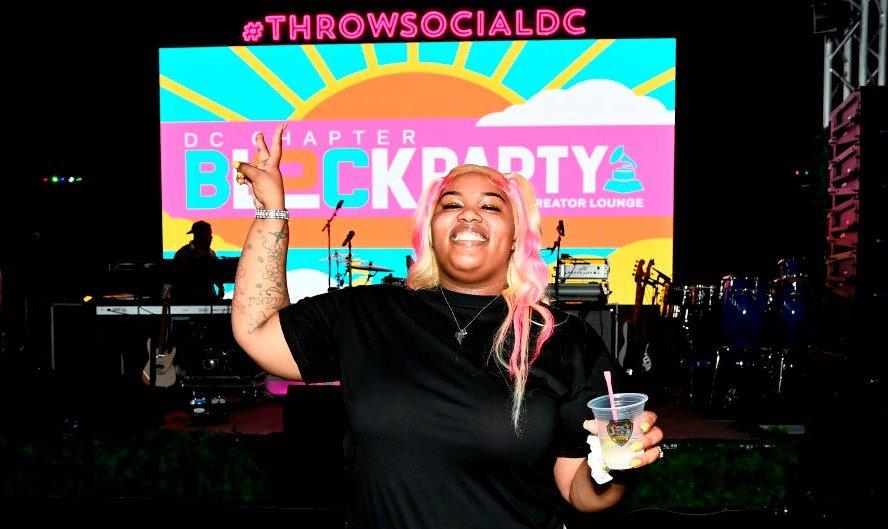Photo: Brian Stukes/Getty Images for The Recording Academy

news
Washington D.C. Chapter Dinner & Conversation Answers "Can We Have Rhythm Without the Blues?"
An intimate private event hosted a discussion led by Recording Academy Washington D.C. Chapter President, Tamara Wellons, and singer/songwriter, Baby Rose to discuss the past, present, and future of the R&B community.
In the serene Capitol Hill neighborhood of Washington D.C., members of the Recording Academy's D.C. Chapter gathered for an exclusive dinner that sparked dynamic discussion and performances, celebrating the unique culture of the R&B community.
In conversation with local creators and artists from the capital region, Recording Academy Washington D.C. Chapter President, Tamara Wellons, and singer/songwriter, Baby Rose, discussed the evening’s primary question, "Can we have rhythm without the blues?"
On Feb. 22, the event unfolded at Bronze, a restaurant inspired by Afrofuturism that merges culinary arts with the culture of the African diaspora. Set in a dimly lit room adorned with gilded artwork, and guests seated at long communal tables, the establishment provided an intimate atmosphere for open and thoughtful dialogue.
In partnership with the Recording Academy's D.C. Chapter and The Black Music Collective, the evening was sponsored by 23andMe, offering a unique opportunity for the community to explore the depths of their heritage and individuality.
Wellons crafted the conversation around the power that R&B has in everyone's life. She shared how this power shapes her own experiences and the ways she lives.
"There’s a place that R&B music is pulled from." Wellons said. She elaborated on how her roles as a mother, wife, and community leader are shaped by her connections to the soul community. "I have to be influential and find the balance," she said.
Born in Washington D.C., Baby Rose, has a profound love for the R&B and soul communities in her hometown. "D.C. is rich in all different types of music — soul just hits differently," said Baby Rose.
"I come from a lineage of strong women," she said to guests. "When it came to finding what I wanted to say, it came from everything I was made to be ashamed of." Finding that power in things that once brought her shame has been an enduring influence on her distinctive sound.
Rose went on to note the impact R&B has had on her music and her roots, both as a woman of color and an artist. “I think (the music) hits different when you tell your story,” she said. “This last record I did in the span of two weeks, and it all poured out of me.”
Between a delicious four course meal and meaningful discussion, Baby Rose performed a stripped version of her new single "One Last Dance," accompanied by Guitarist Ari O’Neal. O’Neal, hailing from Takoma Park, Maryland, also grew up on soul music and used that influence to craft her own genre of R&B. Guests in attendance bore witness to just an ounce of her incredible magic.
As the night continued, conversation centered around more than just the historical impacts of the R&B community and dug deeper into the ways that R&B has helped to transform the mindset of our artists. Guests broke out into small conversation groups and the sense of passion for the DMV community illuminated the room. The topic brought powerful insights, not only on the present, but for the future.
The conversations were impactful, the community was strong, and the consensus confirmed that hope lies within the next generation, but only if the conversation continues.
How R&B Took Over The 2024 GRAMMYs: From Best New Artist Nominees To The GRAMMY Stage

Photo: Brian Stukes/Getty Images for The Recording Academy
news
The Recording Academy's Washington D.C. Chapter 2024 Block Party Kicked Off Summer With A Celebration Of Impactful & Empowering DMV Creatives
Performances from artists Foggieraw, Huntley, and Be'la Dona, accompanied by The Amours and Taisha Estrada, spotlighted the one-of-a-kind talent pouring out of the DMV community at the Washington D.C. Chapter annual Block Party event.
Members of the Recording Academy's Washington D.C. Chapter gathered to celebrate the unique artistry of the DMV music community at the annual Block Party on June 6.
Passionate energy filled the walls of Sycamore & Oak, a vibrant community center located five miles from the heart of D.C., where guests enjoyed powerful conversations about the future of the industry and live music from Foggieraw, Huntley, and Be'la Dona accompanied by The Amours and Taisha Estrada. With the sounds of DJ Face welcoming attendees as they entered, the party was ready to begin.
The night's celebrations started as attendees gathered into the venue's Creator Lounge. Between cocktails and conversations, guests could be found reminiscing with colleagues about moments and memories that took place throughout the year. A retail village of local businesses provided the perfect opportunity for attendees to shop and get acquainted with the space before the night's festivities began.
Opening up the night was the evening's host, TeezySoDope, an instrumental artist central to the DMV community. From Virginia Beach, Teezy proudly uplifts and represents the place she calls home.
"I know the sense of pride, literally, that the DMV carries about making sure we represent it. That we stand by [the community], and we push it," Teezy said in conversation right before hitting the stage.
Hip-hop and R&B artist Foggieraw, a Virginia native, captivated the crowd with a powerful set that beautifully blended the raw power of spoken word poetry with the artistic sounds of hip-hop and R&B. Crediting the roots of his artistry to the DMV, he hopes to inspire other local artists to pour into their passions.
"A kid like I was, just out there, they are going to feel that [becoming a professional artist] is so hard to do. Just the same way it felt for me." said Foggieraw. "I want them to see: 'Oh, he did it,' so it's possible to do it." He described the feeling of the Block Party as "being right back at home."
Rising rock 'n roll sensation Huntley blended his authentic American blues sound to perform a cover of Ben E. Kings's "Stand By Me", as well as his original unreleased song, "Tell Me When It’s Over". Just a few months ago, Huntley, accompanied by his coach Niall Horan, was crowned the Season 24 winner of "The Voice." Since then, he has secured a core audience and a recording contract from Republic Records.
"We're touring the world and we're flattered to be representing the DMV," Huntley said. Touching on what the moment means to him as a parent, he continued, "This is for moms and dads out there still trying to make a dream come true."
Artist, educator, and incoming D.C. Chapter President Deborah Bond echoed Huntley, recognizing the family that lies within this community. "The Block Party feels like I can really give everyone a big individual hug. I can make you feel seen, I can come to you, and touch you, and say I'm here," she said.
The Amours, sister duo Jakiya Ayanna and Shania Aisha, brought their sensual sound to the stage in perfect harmony. They noted how events such as the Block Party allow them to give back to the place that raised them.
"We're a product of the D.C. arts community. We're a product of Bohemian Cavern, Duke Ellington School of The Arts, and are a product of D.C. directly when it comes to the creative arts family and community," Jakiya said. Shania added, "It's amazing to see the growth, the change, and to be a part of that.”
As the sun came shining down on an unforgettable evening, the sensational sounds of Be'la Dona, an all-women D.C.-based go-go band, brought everyone to the dance floor with their "Sensual Crank" fusion of rock, R&B, gospel, pop, and jazz — an undeniably electric sound.
Accompanied by the enchanting multi-genre sound of Taisha Estrada and the soulful sound of The Amours, friends turned into family as they celebrated the end to yet another outstanding Block Party.
Watch The Amours Breathe New Life Into Fantasia's "Free Yourself" | ReImagined

Photo: The Recording Academy
list
Key Takeaways From The Recording Academy Roundtable At The 45th Annual Blues Music Awards: From Membership to Submissions
On May 9, the Recording Academy gathered during the Blues Music Awards 2024 to discuss simplifying the GRAMMY membership and submission process for blues artists and the intricacies of requirements and voting.
The second week of May saw music artists from around the world convene in Memphis, Tennessee, for the 45th Annual Blues Music Awards and a host of related events, including the Blues Hall of Fame Induction Ceremony. Amid the excitement, a significant event took place on May 9: a roundtable discussion on Recording Academy membership and the GRAMMY Awards process, sponsored by the Recording Academy in partnership with the Memphis-based Blues Foundation.
The panel, moderated by Blues Foundation President and CEO Kimberly Horton, included GRAMMY-winning blues guitarist Christone “Kingfish” Ingram, GRAMMY-nominated performer Castro “Mr. Sipp” Coleman as well as Recording Academy Membership Manager Shelly Surdoval, and Senior Manager for Awards Ralph Olivarez.
A mixed audience of established and emerging performers including Shemekia Copeland and Danielle Nicole, Memphis Chapter Governor Marcella Simien, and industry veterans like Chicago producer Michael Freeman — a former Governor, Chapter President and National Trustee for the Chicago Chapter and a former Blues Foundation board member — packed a meeting room at the Sheraton Hotel Downtown for the insightful conversation.
The wide-ranging conversation, which also drew in audience members through an extended Q&A session, covered a lot of topics in depth, including membership requirements, perceptions of non-members, the intricacies of voting, and the submission process.
Here are four takeaways from the Recording Academy’s BMAs roundtable discussion:
A GRAMMY Is A Game Changer
For any artist, a GRAMMY nomination or win can mean the difference between music being a fun side hustle and making it a career. That’s especially true in the blues world.
“It definitely boosted me tremendously,” said Ingram about his 2022 GRAMMY for Best Contemporary Blues Album. “After the win, I started playing festivals like Bonnaroo. That’s what we need. We need more blues artists in that space to show that we’re still around."
Coleman, who burst on the scene a decade ago by winning the Blues Foundation’s International Blues Challenge, said he was looking forward to experiencing his own boost following his nomination earlier this year for Best Traditional Blues Album for The Soul Side of Mr. Sipp as well as his participation on a GRAMMY-winning album by the Count Basie Orchestra for which, he learned during the roundtable, he qualified for a participation certificate.
“My schedule for this year was booked before February when the GRAMMY nominations were announced,” said Coleman. “I’m really looking to see the effect of what happened in February next tour season as well as hopefully be landing another nomination.”
GRAMMY Submissions Come With Expert Assistance
“Kim [Horton] helps me with all my submissions,” said Coleman in his introductory remarks, “because I don’t like the little computers and gadgets and stuff.”
Coleman’s comment underscored that — big names like Buddy Guy and Kingfish aside — for most blues artists making music is a cottage industry where if anything gets done it's done by them. That reality makes the paperwork required for awards submissions even more daunting.
Fortunately, the staff at the Recording Academy is here to help. Several times during the panel exchange, Surdoval and Olivarez stressed that if artists had any questions or problems, they just needed to ask.
“We’ve been doing outreach to the blues community for 10-plus years at the Blues Music Awards,” said Sr. Executive Director Jon Hornyak of the Memphis Chapter in his introductory remarks. “We feel like there’s a lot more recordings from the blues community that could be entered in the GRAMMY process. And I think sometimes people think that, well, we’re not going to get a GRAMMY nomination. But every year when you look at the nominations in the blues category there are surprises and there are smaller releases and it’s not always the biggest names.”
The Recording Academy Makes Membership Accessible
Throughout the conversation, it became clear that membership was the first barrier to GRAMMY participation. To be clear, there are some intricacies to proving a prospective member's professional qualifications. But panelists and Recording Academy members in the audience took great care to demystify the process.
That process starts with letters of recommendation from two music industry peers who don’t have to be Academy members. Then applicants need to fill out a professional profile that can include related marketing and press materials; awards and honors; online materials showing a resume of work such as tour dates, music videos, discography, fan interaction, and streaming or sales stats; and proof of professional associations such as managers, publicists, or booking agents.
“I’m sure everyone in this room qualifies as a voting member,” said Larry Batiste, a trustee from the San Francisco Chapter. “It's a peer-to-peer org, so we really need people to be joiners, to be members who really know about the music so that you can vote on what you know. And it's not rocket science to join.”
And, again, if prospective members hit a snag, the panel made it clear they can always reach out for help. Joyce Ann Houston, a St. Louis-based vocalist, trumpeter, and songwriter, who as "Lady J Houston" has played with Albert King among others, found herself in just such a predicament recently.
“I was in the middle of applying, and when I reached out to Shelly for help she had already created my account,” she said. “Now I’m looking forward to being in the class of 2024, hopefully.”
There Are More GRAMMYs For Blues Artists Than Ever
Since the introduction of separate Traditional Blues Album and Contemporary Blues Album categories in 2017, there are more opportunities than ever for blues artists to participate in the GRAMMY process. And they are not just limited to those two new categories.
“We also have track categories that you can submit from your albums,” said Olivarez, who pointed attendees to GRAMMY101.com as an online guide to the complete GRAMMY Awards process. “Blues tracks would qualify in American Roots Performance and American Roots Song. We also have Americana performance [categories] because we understand that albums aren’t just one genre. And we also have craft categories: We have album notes. We have packaging. We have Producer Of The Year. We have engineering. So you can enter in those as well.”
But despite all these avenues for recognition, it was clear from the conversation that not enough artists are taking advantage of them. At one point during the discussion, Horton and Olivarez compared submission numbers; last year the BMAs had 261 total submissions compared to just 102 for the GRAMMYS.
“People just don’t think they can do it. They don’t think they can qualify to do it,” said Horton, who in her role helps a lot of artists navigate the process. “They think they have to be of a certain stature or at a certain place in their career to even submit, and that’s not true.”
Added Coleman, “I just believe that, if you don’t even try, that's a guaranteed way not to succeed.”

Photo: Shannon Finney/Getty Images for The Recording Academy
news
Revisit The 2023 Washington D.C. Chapter Block Party: Championing Artistry & Advocacy
At its first block party in four years, the Recording Academy's Washington D.C. Chapter showcased its support for music and the artists who make it. Take a peek inside the July 28 event, held at THRōW Social D.C.
Cheers filled the room on July 28 as guests of the Recording Academy's Washington, D.C. Chapter block party — the chapter's first in four years.
The world has changed significantly since the Chapter's last block party, but as Chapter President Tamara Wellons (who is also a gifted vocalist) noted, one thing remains the same: "Music is that thing that really helps us."
The six-hour event provided the opportunity for both fellowship and knowledge-building. The first half featured a Creator Lounge, where panelists spoke on the nuances of an ever-changing industry and how musicians can adapt, advocate and monetize their work. The block party itself took place on the rooftop of THRōW Social D.C., and included finger foods, cocktails and performances by local artists. Among those artists was DJ Oji, a Brooklyn-bred and Baltimore-based house DJ.
The block party fell on the same day as The Day that Music Cares, the first-ever day of service for the music community. To commemorate this day, attendees were encouraged to bring school supplies for the chapter’s back to school drive.
For Wellons, it was extremely important that the block party be equally diverse, informative, and fun. The goal was for the local music community to walk away with the knowledge they need to advance their careers.
"One thing we wanted to do was have our block party be just a little different not just an average party," Wellons told GRAMMY.com. "We wanted to get organizations that offered grants, like the Maryland State Arts Council or the D.C. Commission [on The Arts & Humanities]. They have these grants and things that a lot of our music community don't know about and have not taken advantage of completely."
The advancement of knowledge about available resources, along with the idea of advocacy, were huge themes throughout the event. Members attended discussions about the potential uses of AI, the RAP Act and the importance of ensuring all creators get paid fairly.
The first panel, which was led by Todd Dupler, the Recording Academy’s Acting Chief Advocacy & Public Policy Officer, and Dr. Chelsey Green, the Vice Chair of the Board of Trustees, discussed the Academy’s efforts to fight on behalf of music creators.
"What's great about the Recording Academy is that we represent all creators, no matter their craft or their genre," Dupler said. "Especially here in the Washington D.C. chapter, there's always been great synergy between having a chapter in our nation's capital and the advocacy work that we do year-round."
Members of the D.C. Chapter were also given exclusive access to register early for District Advocate Day, an initiative through which Recording Academy members across the country can get involved in the Academy’s advocacy work.
"My hope is that [members] understand that we value not only what they do as an Academy member, but who they are as a working musician, [as well as] what needs they have as an artist and how we can support that," said Green, a skilled violinist and founder of the Green Project, an ensemble that aims to break down stereotypes around the violin and viola. "We're all part of one Academy, and that is what the Academy is about. It’s about the community supporting creators year-round."
The second panel, which was led by YouTube Music Global Music Strategist Lead Mahlet Seyoum, discussed YouTube monetization and how creators can benefit from the use of assets like YouTube Shorts. For Seyoum, it is important for marginalized creators, especially Black ones, are able to profit and receive the utmost credit for their work.
"I'm always going to be holding it down for us and making sure that the people who are really the bedrock of the culture — are producing the most content and are at the top of the charts — are able to monetize, profit off of and grow from their creativity, from their work and from their art," said Seyoum.
The block party portion of the event kicked off with performances by Pinky Tha Rapper and Noochie, two Washington D.C. rappers on the rise, along with sounds by DJ Joxfroxi.
"[D.C.’s] just a very unique place when it comes to fashion, music, even the Black experience," said Noochie, who is known for his #FrontPorchFreestyles series on Instagram and is inspired by D.C.'s life and culture. "I've been to a lot of other cities, and I don't feel as comfortable as I do here. I consider myself lucky to be from here."
Other performers included DC-based indie soul band Oh He Dead, as well as three-time GRAMMY nominee Raheem DeVaughn and his go-go band, the Crank Crusaders.
Wayna, a GRAMMY-nominated singer and actress who co-authored the Best Song For Social Change Award, enjoyed each aspect of the block party, which allowed for learning, relaxation and entertainment. A newly elected member to the Recording Academy’s Board of Trustees, she resonated greatly with the messages around advocacy.
"I became an artist because I wanted to tell stories, and very often the stories that I want to tell — and a lot of marginalized artists want to tell — are those of people who don't have a voice," she said. "The point of creating that empathy and connection through music is so that we can have a world where it's more equitable and people have more opportunities. That is the outcome of great art."
The energy at the block party certainly indicates that the Recording Academy's D.C Chapter knows how to party; but more than that, they know how to cultivate community and connection during a time at which those things are needed most.
2023 GRAMMY Camp Musicians Share Their Artist Session Experiences
